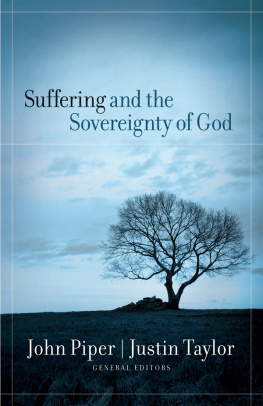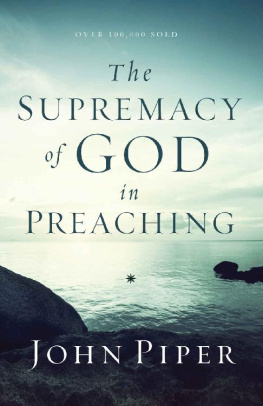John Piper - Coronavirus and Christ
Here you can read online John Piper - Coronavirus and Christ full text of the book (entire story) in english for free. Download pdf and epub, get meaning, cover and reviews about this ebook. year: 2020, publisher: Crossway, genre: Religion. Description of the work, (preface) as well as reviews are available. Best literature library LitArk.com created for fans of good reading and offers a wide selection of genres:
Romance novel
Science fiction
Adventure
Detective
Science
History
Home and family
Prose
Art
Politics
Computer
Non-fiction
Religion
Business
Children
Humor
Choose a favorite category and find really read worthwhile books. Enjoy immersion in the world of imagination, feel the emotions of the characters or learn something new for yourself, make an fascinating discovery.
- Book:Coronavirus and Christ
- Author:
- Publisher:Crossway
- Genre:
- Year:2020
- Rating:3 / 5
- Favourites:Add to favourites
- Your mark:
- 60
- 1
- 2
- 3
- 4
- 5
Coronavirus and Christ: summary, description and annotation
We offer to read an annotation, description, summary or preface (depends on what the author of the book "Coronavirus and Christ" wrote himself). If you haven't found the necessary information about the book — write in the comments, we will try to find it.
Coronavirus and Christ — read online for free the complete book (whole text) full work
Below is the text of the book, divided by pages. System saving the place of the last page read, allows you to conveniently read the book "Coronavirus and Christ" online for free, without having to search again every time where you left off. Put a bookmark, and you can go to the page where you finished reading at any time.
Font size:
Interval:
Bookmark:
Part 2
What Is God Doing through the Coronavirus?
Chapter 9
Answer 4.
The coronavirus is Gods thunderclap call for all of us to repent and realign our lives with the infinite worth of Christ.
The coronavirus is not unique as a call to repentance. In fact, all natural disasterswhether floods, famines, locusts, tsunamis, or diseasesare Gods painful and merciful summons to repent.
We see this from the way Jesus responds to disaster in Luke 13:15:
There were some present at that very time who told him about the Galileans whose blood Pilate had mingled with their sacrifices. And he answered them, Do you think that these Galileans were worse sinners than all the other Galileans, because they suffered in this way? No, I tell you; but unless you repent, you will all likewise perish. Or those eighteen on whom the tower in Siloam fell and killed them: do you think that they were worse offenders than all the others who lived in Jerusalem? No, I tell you; but unless you repent, you will all likewise perish.
Pilate had slaughtered worshipers in the temple. The tower in Siloam had collapsed and killed eighteen bystanders. One disaster was the fruit of human wickedness. The other was apparently an accident.
The Meaning of Calamityfor You
The crowds want to know from Jesus , Whats the meaning of this? Was it an act of Gods specific judgment on specific sins? Jesus s answer is amazing. He draws a meaning from these disasters that relates to everyone, not just the ones who died. In both cases, he says, No, those who were murdered by Pilate and those who were crushed under the tower were not worse sinners thanyou.
You? Why does he bring up their sin? They werent asking for his opinion about their own sin. They were curious about the others. They wanted to know what the disasters meant for the victims, not for the rest of us.
Thats what makes Jesus s answer amazing. In essence, he said that the meaning of these disasters is for everyone. And the message is Repent, or perish. He says it twice: Unless you repent, you will all likewise perish (Luke 13:3). Unless you repent, you will all likewise perish (13:5).
Merciful Call While Theres Time
What was Jesus doing? He was redirecting the peoples astonishment. The astonishment that prompted these folks to query Jesus is misplaced. They were astonished that people were murdered so cruelly and crushed so meaninglessly. But Jesus says, What you ought to be astonished at is that you were not the ones murdered and crushed. In fact, if you dont repent, you yourselves will meet a judgment like that someday.
From this, I infer that God has a merciful message in all such disasters. The message is that we are all sinners, bound for destruction, and disasters are a gracious summons from God to repent and be saved while there is still time. Jesus turned from the dead to the living and essentially said, Lets not talk about the dead; lets talk about you. This is more urgent. What happened to them is about you . Your biggest issue is not their sin but your sin. I think thats Gods message for the world in this coronavirus outbreak. He is calling the world to repentance while theres still time.
What Does Repentance Mean?
Lets be more specific. What does repentance mean? The word in the New Testament means a change of heart and mind. Not a superficial change of opinion, but a deep transformation so that we perceive and prize God and Jesus for who they really are. Jesus described the change like this:
You shall love the Lord your God with all your heart and with all your soul and with all your mind. (Matt. 22:37)
Whoever loves father or mother more than me is not worthy of me, and whoever loves son or daughter more than me is not worthy of me. (Matt. 10:37)
In other words, the most fundamental change of heart and mind that repentance calls for is to treasure God with all that you are and to treasure Jesus more than all other relations.
Why Would Jesus Threaten Us with Perishing?
The reason Jesus said that we all likewise would perish if we dont repent is that we all have exchanged the treasure that God is for lesser things we love more (Rom. 1:2223), and we all have treated Jesus as less desirable than money and entertainment and friends and family. The reason all of us deserve to perish is not a list of rules we have broken, but an infinite value we have scornedthe infinite value of all that God is for us in Jesus Christ.
Waking Up to Our Suicidal Preferences
Repentance means waking up from the suicidal preference of tin over gold, foundations of sand over solid rock, games in the gutter over a holiday at the sea. As C. S. Lewis writes:
We are half-hearted creatures, fooling about with drink and sex and ambition when infinite joy is offered us, like an ignorant child who wants to go on making mud pies in a slum because he cannot imagine what is meant by the offer of a holiday at the sea. We are far too easily pleased.
The infinite joy Lewis mentions is the experience of seeing and savoring and sharing the worth and beauty and greatness of Christ.
Roused to Rely on Christ
What God is doing in the coronavirus is showing usgraphically, painfullythat nothing in this world gives the security and satisfaction that we find in the infinite greatness and worth of Jesus . This global pandemic takes away our freedom of movement, our business activity, and our face-to-face relations. It takes away our security and our comfort. And, in the end, it may take away our lives.
The reason God exposes us to such losses is to rouse us to rely on Christ. Or to put it another way, the reason he makes calamity the occasion for offering Christ to the world is that the supreme, all-satisfying greatness of Christ shines more brightly when Christ sustains joy in suffering.
Gift of Desperation
Consider, for example, why God brought Paul to the point where he despaired of life:
We do not want you to be unaware, brothers, of the affliction we experienced in Asia. For we were so utterly burdened beyond our strength that we despaired of life itself. Indeed, we felt that we had received the sentence of death. But that was to make us rely not on ourselves but on God who raises the dead. (2 Cor. 1:89 )
Paul does not view this experience of desperation as satanic or random. It is purposeful. And God is the one whose purpose is mentioned: this life-threatening experience was to make us rely not on ourselves but on God who raises the dead (1:9).
This is the message of the coronavirus: Stop relying on yourselves and turn to God. You cannot even stop death. God can raise the dead. And of course relying on God does not mean that Christians become do-nothings. Christians have never been do-nothings. It means that the ground, the pattern, and the goal of all our doings is God. As Paul said, I worked harder than any of them, though it was not I, but the grace of God that is with me (1 Cor. 15:10).
The coronavirus calls us to make God the all-important, pervasive reality in our lives. Our lives depend on him more than they depend on breath. And sometimes God takes our breath in order to throw us onto himself.
The Meaning of Thorns
Or consider Gods purpose in Pauls painful thorn in the flesh:
To keep me from becoming conceited because of the surpassing greatness of the revelations, a thorn was given me in the flesh, a messenger of Satan to harass me, to keep me from becoming conceited. Three times I pleaded with the Lord about this, that it should leave me. But he said to me, My grace is sufficient for you, for my power is made perfect in weakness. Therefore I will boast all the more gladly of my weaknesses, so that the power of Christ may rest upon me. (2 Cor. 12:79 )
Paul was blessed with great revelations. God saw the danger of pride. Satan saw the danger of truth and joy. God governs Satans strategy so that what Satan thinks will ruin Pauls witness actually serves Pauls humility and gladness. Paul gets a thorn in the flesha messenger of Satan. And a messenger of God! We dont know what the thorn is. But we know that thorns are painful. And we know that Paul asked three times that Christ would take it away.
Font size:
Interval:
Bookmark:
Similar books «Coronavirus and Christ»
Look at similar books to Coronavirus and Christ. We have selected literature similar in name and meaning in the hope of providing readers with more options to find new, interesting, not yet read works.
Discussion, reviews of the book Coronavirus and Christ and just readers' own opinions. Leave your comments, write what you think about the work, its meaning or the main characters. Specify what exactly you liked and what you didn't like, and why you think so.















